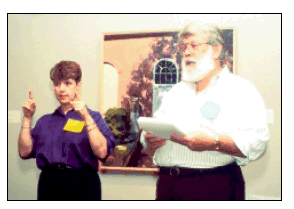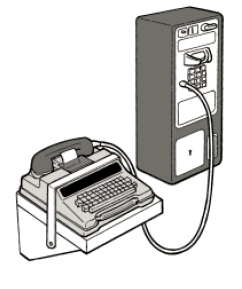4. Effective Communication.
Towns must take appropriate steps to ensure that communications with members of the public, job applicants, and participants with disabilities are as effective as communications with others unless it is an undue financial or administrative burden to do so or it would result in a fundamental alteration (see page 8) in the nature of its program or activity.
Achieving effective communication often requires that towns provide auxiliary aids and services. Examples of auxiliary aids and services include qualified sign language interpreters, assistive listening devices, open and closed captioning, notetakers, written materials, telephone handset devices, qualified readers, taped texts, audio recordings, Brailled materials, materials on computer disk, and large print materials.

A sign language interpreter is one type of auxiliary aid or service that may be requested.
Towns must provide appropriate auxiliary aids and services where they are necessary to achieve an equal opportunity to participate in, and enjoy the benefits of, a service, program, or activity conducted by or for the town. The town must give primary consideration to the type of auxiliary aid requested by a person with a disability. However, the town may provide a different type of aid if it can show that it is an effective means of communication.
Example
A town prepares to hold its annual town meeting in the high school gymnasium. A request is made through the meeting coordinator for real time captioning to be provided for a person who is deaf. Real time captioning displays the spoken content from a meeting or a speech on a large television screen as text. The town gives primary consideration to the request but after discussing alternatives for providing effective communication with the individual who made the request, the town learns that the individual is fluent in American Sign Language (ASL). The town offers to provide a qualified ASL sign language interpreter for the town meeting because it has determined from discussions with the individual that the interpreter can provide effective communication.
Determination of an undue financial burden or a fundamental alteration can only be made by the head of the town government or his or her designee and must be accompanied by a written statement of the reasons for reaching that conclusion. The determination of an undue burden must be based on all resources available for use in the program, service, or activity. When it is not possible to provide a particular type of auxiliary aid to achieve effective communication due to an undue burden or fundamental alteration, the town must take any other action that would not result in such burdens or fundamental alteration, but would nevertheless ensure that individuals with disabilities receive the benefits and services of the program or activity.
If a town communicates with applicants and beneficiaries by telephone, it should ensure that an effective telecommunication system such as communication using the relay system or a TTY (or TDD) be used to communicate with individuals who are deaf, hard-of-hearing or who have speech disabilities. A TTY has a keyboard and visual display for non-verbal communication with another TTY user or a relay system operator. The relay system is provided in each State and permits telephone communication between voice handsets and individuals using a TTY.
A town can choose to provide a TTY without significant expense. Some towns have decided to install a portable TTY next to a public pay telephone and to anchor the portable unit to a shelf. Electrical connections are enclosed to protect against accidental disconnection of power.
Requirements for effective communications also apply to “telephone emergency services” that provide a basic emergency service, such as police, fire, and ambulance, that are provided by public safety agencies, including 9‒1‒1 (or, in some cases, seven-digit) systems. Direct, equal access must be provided to all services included in the system, including services such as emergency poison control information. Where direct access is provided to callers, direct access by TTY users means the telephone emergency service cannot use a relay system or transfer all TTY calls to one operator while other callers have access to all available operators (for more information, see the Department’s publication, Access for 9‒1‒1 and Telephone Emergency Services Under the Americans with Disabilities Act).

A portable TTY mounted on a shelf located next to a pay telephone can provide a low-cost TTY solution.

User Comments/Questions
Add Comment/Question